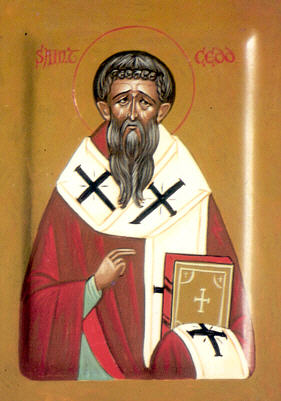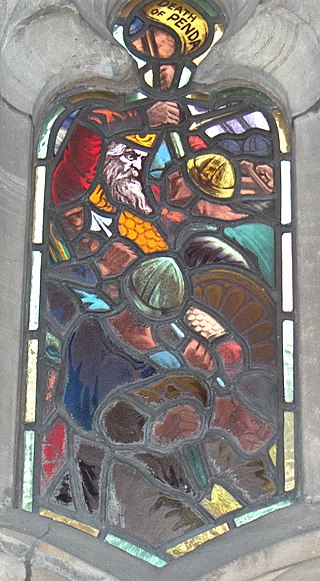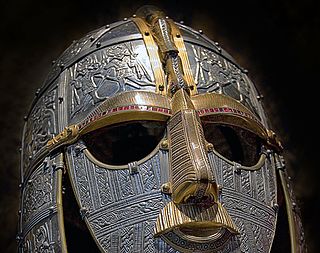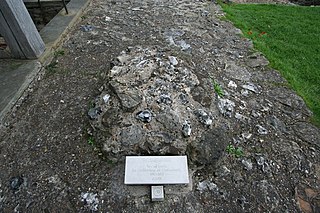Related Research Articles

Year 653 (DCLIII) was a common year starting on Tuesday of the Julian calendar. The denomination 653 for this year has been used since the early medieval period, when the Anno Domini calendar era became the prevalent method in Europe for naming years.

Northumbria was an early medieval Anglo-Saxon kingdom in what is now Northern England and south-east Scotland.
Oswiu, also known as Oswy or Oswig, was King of Bernicia from 642 and of Northumbria from 654 until his death. He is notable for his role at the Synod of Whitby in 664, which ultimately brought the church in Northumbria into conformity with the wider Catholic Church.
The Synod of Whitby was a Christian administrative gathering held in Northumbria in 664, wherein King Oswiu ruled that his kingdom would calculate Easter and observe the monastic tonsure according to the customs of Rome rather than the customs practiced by Irish monks at Iona and its satellite institutions. The synod was summoned at Hilda's double monastery of Streonshalh (Streanæshalch), later called Whitby Abbey.
Wilfrid was an English bishop and saint. Born a Northumbrian noble, he entered religious life as a teenager and studied at Lindisfarne, at Canterbury, in Francia, and at Rome; he returned to Northumbria in about 660, and became the abbot of a newly founded monastery at Ripon. In 664 Wilfrid acted as spokesman for the Roman position at the Synod of Whitby, and became famous for his speech advocating that the Roman method for calculating the date of Easter should be adopted. His success prompted the king's son, Alhfrith, to appoint him Bishop of Northumbria. Wilfrid chose to be consecrated in Gaul because of the lack of what he considered to be validly consecrated bishops in England at that time. During Wilfrid's absence Alhfrith seems to have led an unsuccessful revolt against his father, Oswiu, leaving a question mark over Wilfrid's appointment as bishop. Before Wilfrid's return Oswiu had appointed Ceadda in his place, resulting in Wilfrid's retirement to Ripon for a few years following his arrival back in Northumbria.
Ecgfrith was the King of Deira from 664 until 670, and then King of Northumbria from 670 until his death in 685. He ruled over Northumbria when it was at the height of its power, but his reign ended with a disastrous defeat at the Battle of Nechtansmere against the Picts of Fortriu in which he lost his life.

Æthelred was king of Mercia from 675 until 704. He was the son of Penda of Mercia and came to the throne in 675, when his brother, Wulfhere of Mercia, died from an illness. Within a year of his accession he invaded Kent, where his armies destroyed the city of Rochester. In 679 he defeated his brother-in-law, Ecgfrith of Northumbria, at the Battle of the Trent: the battle was a major setback for the Northumbrians, and effectively ended their military involvement in English affairs south of the Humber. It also permanently returned the kingdom of Lindsey to Mercia's possession. However, Æthelred was unable to re-establish his predecessors' domination of southern Britain.

Wulfhere or Wulfar was King of Mercia from 658 until 675 AD. He was the first Christian king of all of Mercia, though it is not known when or how he converted from Anglo-Saxon paganism. His accession marked the end of Oswiu of Northumbria's overlordship of southern England, and Wulfhere extended his influence over much of that region. His campaigns against the West Saxons led to Mercian control of much of the Thames valley. He conquered the Isle of Wight and the Meon valley and gave them to King Æthelwealh of the South Saxons. He also had influence in Surrey, Essex, and Kent. He married Eormenhild, the daughter of King Eorcenberht of Kent.

Penda was a 7th-century king of Mercia, the Anglo-Saxon kingdom in what is today the Midlands. A pagan at a time when Christianity was taking hold in many of the Anglo-Saxon kingdoms, Penda took over the Severn Valley in 628 following the Battle of Cirencester before participating in the defeat of the powerful Northumbrian king Edwin at the Battle of Hatfield Chase in 633.
Eanflæd was a Deiran princess, queen of Northumbria and later, the abbess of an influential Christian monastery in Whitby, England. She was the daughter of King Edwin of Northumbria and Æthelburg, who in turn was the daughter of King Æthelberht of Kent. In or shortly after 642 Eanflæd became the second wife of King Oswiu of Northumbria. After Oswiu's death in 670, she retired to Whitby Abbey, which had been founded by Hilda of Whitby. Eanflæd became the abbess around 680 and remained there until her death. The monastery had strong association with members of the Northumbrian royal family and played an important role in the establishment of Roman Christianity in England.

The Battle of the Winwaed was fought on 15 November 655 between King Penda of Mercia and Oswiu of Bernicia, ending in the Mercians' defeat and Penda's death. According to Bede, the battle marked the effective demise of Anglo-Saxon paganism.
Œthelwald was a King of Deira. He was the son of King Oswald of Northumbria, who was killed at the Battle of Maserfield in 642.

Aldfrith was king of Northumbria from 685 until his death. He is described by early writers such as Bede, Alcuin and Stephen of Ripon as a man of great learning. Some of his works and some letters written to him survive. His reign was relatively peaceful, marred only by disputes with Bishop Wilfrid, a major figure in the early Northumbrian church.
Osthryth, queen of the Mercians, was the wife of King Æthelred and daughter of King Oswiu of Northumbria and his second wife Eanflæd. She probably married Æthelred before 679 and was murdered by the nobles of Mercia.
Æbbe, also called Tabbs, was an Anglian abbess and noblewoman. She was the daughter of Æthelfrith, king of Bernicia from c. 593 to 616. She founded monasteries at Ebchester and St Abb's Head near Coldingham in Scotland.
Sigeberht II, nicknamed the Good (Bonus) or the Blessed (Sanctus), was King of the East Saxons, in succession to his relative Sigeberht I the Little. Although a bishopric in Essex had been created under Mellitus, the kingdom had lapsed to paganism and it was in Sigeberht's reign that a systematic (re-)conversion of the East Anglians took root. Bede's Historia Ecclesiastica, Book III, chapter 22, is virtually the sole source for his career.

In the seventh century the pagan Anglo-Saxons were converted to Christianity mainly by missionaries sent from Rome. Irish missionaries from Iona, who were proponents of Celtic Christianity, were influential in the conversion of Northumbria, but after the Synod of Whitby in 664, the Anglo-Saxon church gave its allegiance to the Pope.
Æthelwold, also known as Æthelwald or Æþelwald, was a 7th-century king of East Anglia, the long-lived Anglo-Saxon kingdom which today includes the English counties of Norfolk and Suffolk. He was a member of the Wuffingas dynasty, which ruled East Anglia from their regio at Rendlesham. The two Anglo-Saxon cemeteries at Sutton Hoo, the monastery at Iken, the East Anglian see at Dommoc and the emerging port of Ipswich were all in the vicinity of Rendlesham.

Events from the 7th century in England.
References
- Kirby, David P., The Earliest English Kings. London: Unwin Hyman, 1991. ISBN 0-04-445691-3
- Yorke, Barbara, Kings and Kingdoms in Early Anglo-Saxon England. London: Seaby, 1990. ISBN 1-85264-027-8